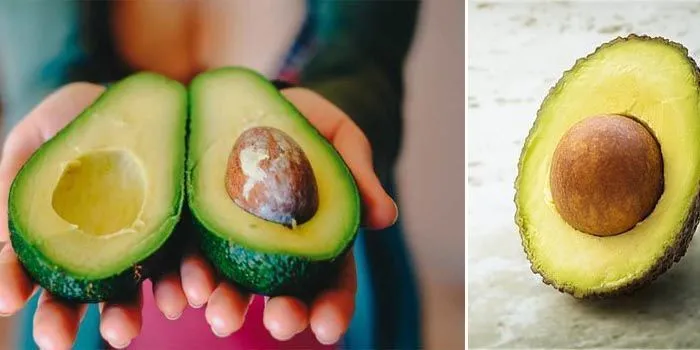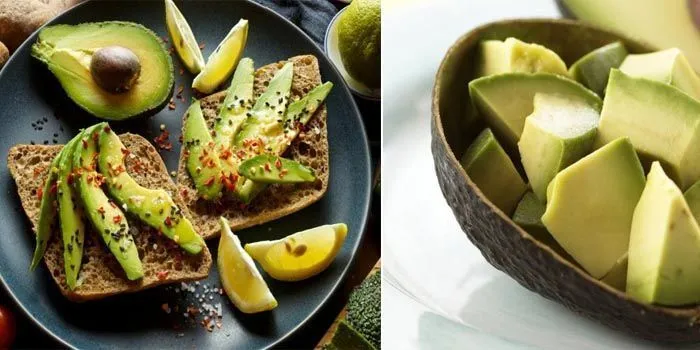Avocados have become one of the most famous foods of recent years and world production has been steadily increasing. In fact, it is one of the few fruits whose demand far exceeds the production rates and the supply of companies.
This is due to the appearance of scientific trials that demonstrated the great properties of avocado and the benefits to the human body.
This has created a huge consumer boom. In addition, its application in the gastronomy of many countries is wide and is a very versatile fruit to include in salads, sauces (guacamole), toast and a lot of other recipes.
The properties of avocado are still being contrasted daily, demonstrating that its mineral concentration and its high contribution in healthy fatty acids (omega 3 and omega 6) are beneficial for cardiovascular health.
Table of Contents
Properties of avocado and benefits for the body
We will first study the nutritional composition of avocado. We value energy intake (kilocalories), accumulated fat (and its distinction between saturated and unsaturated), fiber, vitamins and minerals.
From here we will have an overview of the properties of avocado that we can associate with the benefits in cardiovascular health, the prevention of diseases due to its antioxidant power and a multitude of additional benefits.
1. Balanced nutritional composition

Although in the market we can find many varieties of avocado, the most famous by volume of production is the Hass avocado. However, in terms of the properties of avocado and its nutritional composition, there are no significant differences and we will encompass them.
Nutritional characteristics
Let’s take as an example the consumption of an avocado of medium size (200 grams). From here we can easily extrapolate in the event that we take half (100 grams) or only 1/4 (25 grams).
The term RDA refers to Recommended Daily Allowance.
Total energy: 322 kcal (16% RDA)
Proteins: 4 g (8% RDA)
Carbohydrates: 17.1 g (16% RDA)
Fibre: 13.5 g (54% RDA)
Total fat: 29.5 g (45% RDA)
- Saturated fat: 4.3 g (21% RDA)
- Unsaturated fat: 19.7 g
From what we can see with the naked eye, the properties of avocado provide us with a high concentration of vegetable fiber, beneficial for the digestive system and scientifically proven for the prevention of digestive and colon cancer.
We have a food with a high contribution of calories and that therefore must be measured when we are subjected to diets for weight loss.
Although its concentration in fats is high, most of it is unsaturated fat, considered beneficial for the body.
The properties of avocado in terms of its antioxidant power is closely linked to its content in omega 3 (221 MG) and omega 6 (3396 mg), being considered one of the fruits that provides us with the highest concentration of these elements.
Vitamin content
The contribution of vitamins by the avocado is very balanced and proportionate, something very positive since we complete the daily needs with the moderate consumption of avocado in different dishes and throughout the day.
We will evaluate the concentration of vitamins and the recommended daily amount that completes by the consumption of 1 avocado of medium size (200 grams approximately).
| Composition | Concentration | Recommended Daily Amount |
|---|---|---|
| Vitamin A | 293 μg | 6% |
| Vitamin C | 20.1 mg | 33% |
| Vitamin E | 4.2 mg | 21% |
| Vitamin k | 42.2 mg | 53% |
| Thiamine | 0.1 mg | 9% |
| Riboflavin | 0.3 mg | 15% |
| Niacin | 3.5 mg | 17% |
| Vitamin B6 | 0.5 mg | 26% |
| Folate | 163 mg | 41% |
Avocado provides us with a very high amount of vitamin C (33% RDA), vitamin K (53% RDA) and the group of B vitamins, although it has a very balanced fraction of the rest. Therefore, many of the propAvocados will be linked to their concentration of this type of functional vitamins.
Mineral concentration
In the criterion of mineral concentration, the same is fulfilled as for the case of vitamins. There is a very homogeneous distribution between different minerals and micronutrients.
Especially, from what you will see below, it stands out for its high potassium content, direct competition from the banana.
Mineral contribution of 1 medium-sized avocado (200 grams).
- Calcium: 24.1 mg (2% RDA)
- Potassium: 975 mg (28% RDA)
- Phosphorus: 105 mg (10% RDA)
- Magnesium: 58.3 mg (15% RDA)
- Iron: 1.1 mg (6% RDA)
- Zinc: 1.3 mg (9% RDA)
- Copper: 0.4 mg (19% RDA)
- Manganese: 0.3 mg (14% RDA)
High potassium concentration
If we made the comparison between one of the foods best known for its contribution in potassium, the banana, and compare it with the content of this mineral of the avocado, we are going to take a remarkable surprise.
Let’s make the comparison:
Medium banana potassium content (118 grams): 422 mg (12% RDA)
Medium avocado potassium content (200 grams): 975 mg (28% RDA)
It is true that a banana is easier to consume, due to its size and flavor, than a whole avocado. However, equal in quantity (100 grams), the avocado still wins by far in terms of potassium consumption.
As you know, the importance of potassium is vital to keep sodium at bay (and limit hypertension) and regulate the electrolyte levels of the body, closely related to the appearance of muscle cramps in athletes (who do not hesitate to throw a banana in the backpack).
Therefore, we have more properties of avocado related by its high concentration in potassium.
2. Rich in unsaturated fatty acids and heart benefits

One of the largest sources of unsaturated fatty acids comes from the properties of agaucate.
These fats, as long as they are monounsaturated, such as those in olive oil, are beneficial for the body due to their high concentration of antioxidants.
In fact, 77% of the calories it contains are from fat, making it one of the fattiest plant foods out there.
The contribution of omega 3 and omega 6 to the daily diet has an impact, according to scientific trials, on the prevention of cardiovascular diseases. Heart attacks, ischemia and strokes.
3. High concentration of antioxidants
Within the properties of avocado, we find an ideal relationship of antioxidants and vitamins that have a significant impact on the health of our body.
Among these antioxidants we mention zeaxanthin, lutein and carotenoids, involved in the reduction of free radicals and cellular oxidation. [Study]
Many of these elements are related to eye health and the reduction of loss of visual acuity and suffering degenerative processes of vision.
4. The properties of avocado reduce the level of cholesterol and triglycerides
Although the total fat content in the properties of avocado is high, the comparison between monounsaturated and polysaturated fats is well differentiated.
Cholesterol is one of the main diseases, along with diabetes, the twenty-first century in Western countries. A diet high in polysaturated fats, carbohydrates and sugars, produces a great restriction of the ability to pump blood by the heart and produces thrombi and arterial narrowings.
The properties of avocado have a lot to say in the prevention of this type of disease, reducing the accumulation of bad cholesterol (LDL), triglycerides and increasing unsaturated and beneficial fats. [Study]
Generally speaking, moderate and regular consumption of avocado can produce the following beneficial effects related to cholesterol reduction.
- Reduce blood triglyceride levels by up to 20%
- Increase good cholesterol or HDL by more than 10%
- Reduce the level of bad cholesterol or LDL by 22%
If in addition to the consumption of avocado we combine it with sports practice and the increase of foods with fiber, low in fat and of vegetarian origin, the effect is much more significant, as some scientific studies have shown. [Study]
However, it is still necIt is necessary to delve deeper into the studies to obtain more significant results.
5. Benefits in the assimilation of other nutrients
The high percentage and balance of vitamins, minerals and healthy fats stimulate the assimilation and transport of other nutrients that avocado does not provide.
These conclusions have been obtained from different clinical trials where they have evaluated the importance of antioxidants such as carotenoids and vitamins A, D, E and K in the absorption of other antioxidants, multiplying their assimilation several times. [Study]
6. May prevent cancer-related diseases

Cancer is one of the main diseases of the twenty-first century. Many times the term “anticancer” is attributed to products when the answer sought by the scientific community is prevention based on a diet rich in plant products, sports activity and high presence of antioxidants.
Therefore, within these terms, avocado can help in the management of antioxidant elements, concentration of vitamins, unsaturated fats (omega 3 and omega 6) beneficial to the body, minerals and vegetable fiber.
These elements have been studied in different clinical trials, demonstrating a reduction in the side effects caused by chemotherapy. [Study]
Its potential effect on the development of prostate cancer has also been evaluated at the laboratory level. [Study].
Therefore, some more trials with greater statistical rigor and repetitions are needed to attribute these preventive properties against different tumors, but the initial path has already been evaluated and the effects are positive.
7. May reduce muscle and joint damage
The non-saponifiable fats of the properties of avocado they are responsible for nourishing many muscle groups, reducing chronic joint pain and chronic muscle inflammations.
The properties of avocado have been evaluated along with other natural fats from soy, by virtue of seeking a positive effect against osteoarthritis. [Study]
However, research still needs to be advanced to prove its potential effects on muscle and joint damage.
8. Regulates the fat index and controls body weight
Replacing saturated fats with unsaturated fats and increasing fiber intake has a favorable impact on reducing body weight.
The consumption of avocado in a moderate way together with the intake of other healthy foods can contribute to reduce the concentration of abdominal fat and, therefore, to reduce body weight.
This is linked to the fact that avocado is a very caloric product and that it provides a lot of energy without necessarily being harmful, so its satiating capacity is very high and we do not need to take other products that can become more harmful due to their fat content and salts such as sodium. [Study]
Do you know more beneficial properties of avocado for health?
